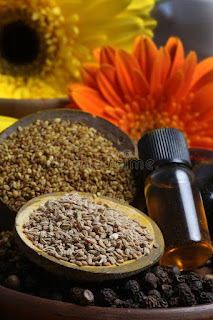Carom seeds
Introduction
Carom is an annual herb belongs to the family Apieceae. The carom seeds botanical name Trachy spermumammi.Seeds and leaves are edible parts of plant.The herb is generally grown in October–November and harvested in May–June. Usually grayish brown seeds or fruits of Ajwain are considered for medical and nutritional purposes.They smell precisely like thyme since they likewise contain thymol, yet they are more fragrant and more obvious in taste, just as being to some degree unpleasant and impactful.The fruits are once in a while eaten crude; they are ordinarily dry-roast or fried in ghee that permits the zest to foster a more unpretentious and complex fragranceThe aroma chemicals present in essential oil from fruits are detailed, the key constituents from the volatile oil being thymol and carvacrol. The fruits are also used in pickles, biscuits and sweets. The essential oil is sometimes added to food as a preservative.In Indian cuisine, carom seeds are used to flavour vegetarian dishes primarily legumes or dal.
Nutritional values of Carom seeds
Calories,fats, Proteins, Carbohydrates, Antioxidants
vitamins B1 and B3,
minerals like sodium, potassium, calcium, iron and phosphorus.
Thymol (39.1%) was found as a major component along with p-cymene (30.8%), gamma-terpinene (23.2%), beta-pinene (1.7%), terpinene-4-ol (0.8%).
Acetone extract of ajwain showed the presence of 18 identified components which account for 68.8% of the total amount.
The major component was thymol (39.1%) followed by oleic acid (10.4%), linoleic acid (9.6%), gamma-terpinene (2.6%), p-cymene (1.6%), palmitic acid (1.6%), and xylene (0.1%).
Carom seeds Native
The ajwain plant is thought to have native of Persia (Iran) and Asia Minor ( currently Turkey). Carom is a local of Egypt and is developed in Iraq, Iran, Afghanistan, Pakistan, and the India.In the India Carom is used in Ayurvedic medicines.
Carom Description
Ajwain's small, oval-shaped, seed-like fruits are pale brown schizocarps.It is profusely branched with a height of 60–90 cm small, erect with soft fine hair.It has many branched leafy stems, feather-like leaves 2–3 pinnately divided, segments linear with flowers terminal and compound. The fruits are small, ovoid, muricate, around cremocarps, 2–3 mm long, with greyish-brown compressed mericarps with distinct five ridges and tubercular surface. The fruits are the size and shape of parsley.
Carom seeds benefits
1) Ajwain treats any kind of abdominal discomfort due to indigestion like stomach pains or burning sensations.
2) They can even be chewed raw, added to water or tea to extract maximum benefits from their richness in fiber, minerals, vitamins and antioxidants.
3) Carom seeds works as a decongestant when used for cough and cold.Carom seeds can work in chasing away Influenza symptoms.
4) thymol in ajwain seeds acts as a strong fungicide and germicide.
5) It cures the problem of indigestion for pregnant ladies by cleaning the uterus and stomach and solves the issue of irregular periods.
6) Ajwain seeds help in halting pre-mature greying of hair.
7) Ajwain powder is especially useful in lightening acne scars
8) Ajwain seeds possess two qualities that help them fight arthritis. They have antibiotic properties that reduce redness and combat inflammation, and they possess anaesthetic properties that soothe the pain and swelling.
9) To get relieved from nasal congestion, carom seeds can be smelled by crushing them on palm with thumb of another hand.
10) Drinking carom water or mixture of ajwain and jaggery are commonly known home remedies to control asthma related breathing problems and chest congestions.
11) Carom seeds have been used to cure deafness.
12) Consumption of carom seeds tea can help in cleansing body toxins.
13) One can mix one teaspoon of jaggery with some carom seeds to get quick relief from heart problems.
14) Drink ajwain water for curing intestinal pain caused because of indigestion and infection. This herb is also very beneficial for curing liver and kidney malfunctions.
15) In case of swelling due to boils or pimples, make the paste of ground carom seeds with lemon juice. It will be helpful in removing the swelling.
16) Mixture ofmustard oil with ground carom seeds is useful as mosquito repellent.
17) Mixture of Black sesame, Carom seeds, jaggery is useful for treating frequent urination and bed-wetting by children.
18) Mix dried pomegranate flowers, poppy seeds and dried neem leaves. Consume this mixture with milk twice a day during bleeding piles.
19) Carom seeds are also used as an insecticide. Apart from this, this is an orthodox method for treating poisonous insect bites.












No comments:
Post a Comment
thanks for reding. if you have any query regarding with the article ,please ask without any hesitation